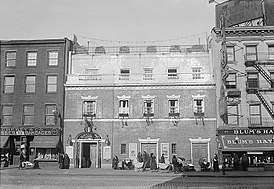Neighborhood Playhouse School of the Theatre
The Neighborhood Playhouse School of the Theatre is a full-time professional conservatory for actors in New York City. First operational from 1915 to 1927, the school re-opened in 1928 and has been active ever since. It is the birthplace of the Meisner technique of acting, named for American actor and acting teacher Sanford Meisner.
 | |
| Type | Drama school |
|---|---|
| Established | 1928 |
| Location | , , United States |
| Website | neighborhoodplayhouse |
History

The Neighborhood Playhouse had originally been founded as an off-Broadway theatre by philanthropists Alice Lewisohn and Irene Lewisohn in 1915, but closed in 1927. The following year, it re-opened as The Neighborhood Playhouse School of the Theatre with the addition of Rita Wallach Morgenthau. Neighborhood Playhouse joined American Academy of Dramatic Arts and Pasadena Playhouse as the only major professional training schools for the performing arts in the United States.[1]
Sanford Meisner joined the faculty in 1935 from the Group Theatre. Meisner used his study of Russian theatre and acting innovator Konstantin Stanislavski's system to develop his own technique, an alternative to Lee Strasberg's method acting. The faculty also included Louis Horst, Agnes de Mille, and Martha Graham.[1][2]
In 1939, when actor Gregory Peck enrolled, there were approximately 90 students at the school.[1] Playwright Horton Foote met actor Robert Duvall at Neighborhood Playhouse when Duvall starred in a 1957 production of Foote's play, The Midnight Caller. Foote recommended Duvall to play the part of Boo Radley in the 1962 film, To Kill a Mockingbird.[3]
The New York City Council honored the 90th anniversary of Neighborhood Playhouse with a proclamation.[2]
Educational programs
The school offers a two-year certificate program, with admission to the second year dependent upon unanimous approval of the faculty.[1] There is also a six-week summer intensive program.
The Neighborhood Playhouse also offers Playhouse Juniors, a Saturday training program for children in grades 1–12. Children attend a fixed curriculum of singing, acting, and dancing classes in a non-competitive environment.
Alumni
- R.J. Adams
- Agnes Morgan
- Nancy Addison
- Helen Arthur
- Elizabeth Ashley[4]
- Dorothy A. Atabong
- Ashlie Atkinson[4]
- Harold G. Baldridge[4]
- Barbara Baxley[4]
- Kim Basinger
- Amanda Bearse
- Pamela Bellwood
- Michael Bendetti
- Ted Bessell
- Susan Blakely[4]
- Richard Boone
- Connie Britton[4]
- James Caan[4]
- Matthew Carnahan
- June Carter Cash[4]
- Carol Channing[4]
- Leonardo Cimino
- Dabney Coleman[4]
- Charles E. Conrad
- Stephanie Courtney[4]
- Carolina Bartczak [4]
- Mackenzie Davis[4]
- James Doohan
- Illeana Douglas[4]
- Charles S. Dubin
- Keir Dullea[4]
- Griffin Dunne[4]
- Robert Duvall[4]
- William Esper[4]
- Timothy Farrell
- Mary Fickett
- Joe Flanigan
- Meg Foster
- Leonard Frey
- Edith González[5]
- Julie Garfield[4]
- Betty Garrett [4]
- Brian Geraghty[4]
- Jeff Goldblum[4]
- Jonathan Goldsmith[4]
- Farley Granger
- Lee Grant[4]
- Andre Gregory[4]
- Jennifer Grey[4]
- Tammy Grimes[4]
- Wynn Handman[4]
- David Hedison[4]
- Anne Jackson[4]
- Allison Janney[4]
- Jasmine Cephas Jones[4]
- Marta Kauffman[4]
- Diane Keaton
- Grace Kelly
- Ken Kercheval
- Walter Koenig[4]
- Peter Leeds
- Irene Lewisohn
- Alice Lewisohn
- Christopher Lloyd[4]
- Tina Louise
- Sky Lakota-Lynch
- Daniel Mann[4]
- Kathleen Martin
- Dylan McDermott[4]
- Darren McGavin
- Steve McQueen[4]
- Christopher Meloni[4]
- Peter Miller
- South Miller
- George H. Morris (Olympic Equestrian)
- Les Moonves[4]
- Yoko Narahashi
- Leslie Nielsen
- Chris Noth[4]
- Edmond O'Brien
- Susan Oliver
- Chris Paine
- Gregory Peck[4]
- Joanna Pettet
- Suzanne Pleshette
- Amanda Plummer[4]
- Sydney Pollack[4]
- Antoni Porowski
- Tom Poston
- Tony Randall[4]
- Sally Jessy Raphael[4]
- James Remar
- Bert Remsen
- Burt Reynolds
- Doris Roberts[4]
- Wayne Rogers[4]
- Jean Rosenthal
- Kelly Rowan
- Mark Rydell[4]
- Sherie Rene Scott[4]
- Marian Seldes[4]
- Liza Snyder
- David Sobolov
- Scott Speedman
- Mary Steenburgen[4]
- Tom Stewart[4]
- Kenneth Tobey
- Paula Trueman
- Tom Tryon
- Brenda Vaccaro[4]
- Gloria Vanderbilt
- Eli Wallach[4]
- Jessica Walter[4]
- Al Waxman
- Geoffrey Weglarz[4]
- Jerry Weintraub
- Elizabeth Wilson[4]
- Joanne Woodward[4]
- Fei Xiang[4]
- Otis Young
References
- Fishgall, Gary (2002). Gregory Peck : a biography. New York: Scribner. pp. 55-56. ISBN 0-684-85290-X. OCLC 48952197.
- "Neighborhood Playhouse School Of The Theatre & Sanford Meisner To Be Honored By The The Office Of The City Council". BroadwayWorld. October 10, 2018. Retrieved November 29, 2019.
- Robert Duvall (actor), Gary Hertz (director) (April 16, 2002). Miracles & Mercies (Documentary). West Hollywood, California: Blue Underground. Retrieved January 28, 2008.
- "Alumni". Neighborhood Playhouse School of the Theater. neighborhoodplayhouse.org. 2017. Retrieved February 14, 2017.
- "Edith González: biografía, telenovelas y enfermedad de la actriz mexicana" [Edith González: biography, telenovelas and illness of the Mexican actress]. El Comercio (in Spanish). June 13, 2019. Retrieved July 8, 2019.
External links
| Wikimedia Commons has media related to Neighborhood Playhouse School of the Theatre. |